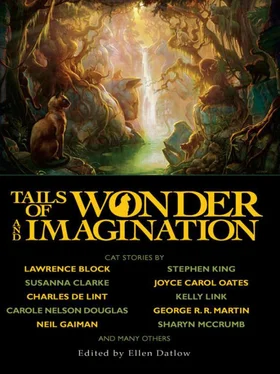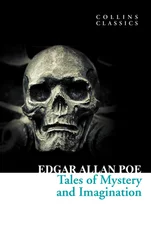Ellen Datlow - Tails of Wonder and Imagination
Здесь есть возможность читать онлайн «Ellen Datlow - Tails of Wonder and Imagination» весь текст электронной книги совершенно бесплатно (целиком полную версию без сокращений). В некоторых случаях можно слушать аудио, скачать через торрент в формате fb2 и присутствует краткое содержание. Год выпуска: 2010, ISBN: 2010, Издательство: Night Shade Books, Жанр: Фэнтези, Фантастика и фэнтези, Ужасы и Мистика, на английском языке. Описание произведения, (предисловие) а так же отзывы посетителей доступны на портале библиотеки ЛибКат.
- Название:Tails of Wonder and Imagination
- Автор:
- Издательство:Night Shade Books
- Жанр:
- Год:2010
- ISBN:978-1-59780-170-6
- Рейтинг книги:5 / 5. Голосов: 1
-
Избранное:Добавить в избранное
- Отзывы:
-
Ваша оценка:
- 100
- 1
- 2
- 3
- 4
- 5
Tails of Wonder and Imagination: краткое содержание, описание и аннотация
Предлагаем к чтению аннотацию, описание, краткое содержание или предисловие (зависит от того, что написал сам автор книги «Tails of Wonder and Imagination»). Если вы не нашли необходимую информацию о книге — напишите в комментариях, мы постараемся отыскать её.
collects the best of the last thirty years of science fiction and fantasy stories about cats from an all-star list of contributors.
Tails of Wonder and Imagination — читать онлайн бесплатно полную книгу (весь текст) целиком
Ниже представлен текст книги, разбитый по страницам. Система сохранения места последней прочитанной страницы, позволяет с удобством читать онлайн бесплатно книгу «Tails of Wonder and Imagination», без необходимости каждый раз заново искать на чём Вы остановились. Поставьте закладку, и сможете в любой момент перейти на страницу, на которой закончили чтение.
Интервал:
Закладка:
“Perhaps,” postulated my mother, “it was the first time making a fortune in marmalade occurred to him.”
In fact, though Arthur did become extremely rich, it formed a dark mark on his escutcheon that none of this wealth was ever put in the way either of my grandparents, or my father’s family, of which it seemed Arthur had been told.
Arthur’s contemporary letter, however, when it reached me, was friendly and warm in tone. He said that he had come across my name in a promotion in the local newspapers, relating to the theatrical performance because of which I was going down to Kent. Since our name is rather unusual, he had decided it must be me, and an inquiry at a London theatre provided him my address. The substance of his letter was to invite me to stay with him at his house. This was, he assured me, only three miles from my business venue, and his chauffeur would, of course, drive me in each day and retrieve me in the evening. Arthur was sure, besides, I would appreciate the comforts of a house over an “inn,” and added that he sincerely hoped I would visit him, we had been “estranged” too long.
Initially I tossed the letter in the waste-paper bin. But then, as I say, curiosity won me round. By that era of my life, I was involved in work I found both fascinating and highly remunerative, so Arthur’s fortune had no allure. But I’d heard of the house, which I will call Blue Firs, a place, it seemed, of luxury. And I confess I wondered very much what Arthur would be like—and if at all like my father, or even myself.
I therefore rescued his letter, and replied in the affirmative. The next morning, I travelled down to Kent.
It was a mild October afternoon when I arrived at Kesslington Station. Arthur’s huge shining car, complete with respectful driver, picked me up and bore me away down autumnal lanes thick with yellow foliage and cows peering across gates.
Blue Firs was a large house, if by no means a mansion. It had been built in the 1800s for someone or other’s mistress. Enormous trees framed the views as we drove up through the grounds, and there gradually appeared a cream-and-rose façade with pillarings and tall windows. Long roofs, with sun-gilded red tiles, had put up the periscopes of rather charming ornamental chimneys, modelled on an earlier design. I could imagine my mother saying, “Ah, the house built of marmalade.”
When I’d got inside, I found myself in one of those polished echoing halls, whose acoustics are normally so bad for actors—a whisper carries like an unintelligible roar, and a roar like a rumble.
I asked the housekeeper if my uncle was about. She told me he was lying down but would meet me at the drinks hour. I went to unpack. It seemed Arthur hadn’t after all lost his social gracelessness, at least where it could be applied to relatives.
But my room was large and airy, with a fire laid ready for later, and the great bed comfortable, and the bathroom well-appointed. Someone had also supplied gin, whisky and soda, and a bowl of hot-house oranges. Not so bad.
When I went down at six, a butler showed me at once into the long, narrow drawing-room that looked out across the lawn. No one else was there.
“Is my uncle coming down?” I asked, rather impatiently.
“Yes, sir. He’ll be here directly.”
“Are there other guests for dinner?”
“No, sir.”
Left alone, I sat by the fireside, watching the brown shadows gather over the room, and the bluer ones fill in the sweep of grass and trees outside.
I felt—and now for the first I admitted it—distinctly uneasy. Was I worried then, to be confronting my “peculiar” uncle? Or was it the big quaint house? I thought not. Already once or twice I had stayed with various theatrical royalty and been in buildings far more eccentric and grandly expanded. Besides, I have never been the nervous type. Even First Nights move me only to extra diligence. A cool head: I’ve been mocked for it.
The shadows thickened. I got up and switched on a pair of lamps, and turning again, saw the light reflecting on a short stocky man, formally dressed for dinner, standing in the wide doorway, and staring at me with enormous eyes. It struck me, extraordinarily, he was most like a child, an anxious child. I had the urge to put him at his ease. And too the wild notion he was truly frightened, scared at meeting at last this alien nephew, son to a brother he had barely troubled to know.
What did I call him?
I decided on mundane family courtesy. “Uncle Arthur?”
“Oh,” he said, “Arthur. We’re both past the age of needing ‘uncle’ shoved in. And you must be—” he named me.
And I found myself saying kindly, “Oh, please call me Jack. It’s what I generally answer to with friends.”
“I hope we shall be,” he said.
“I hope so too.”
He stole forward—no other way to describe it. We shook hands. His was warm enough, but slightly stiff and swiftly withdrawn. He then came to the fire and stood there, lit by the flames and the lamps, his melancholy gaze now on the hearth and now, in fleeting glimpses, on me. Neither of us sat down.
Finally he glanced at the drink in my hand, but didn’t seem to want one for himself. Suddenly he said, “You must think it odd, my contacting you like that, out of the blue.”
“It was a pleasant surprise.”
He looked away from me then, discounting, I thought, the shallowness of my reply. He looked instead at the dark lawn beyond the window, and the trees heavy with a new night.
“Don’t you think,” he said, “this lighted room is like a camp in some jungle place, or on some open plain? A fire, a pair of lamps. Anything might be there,” he said, strangely, “beyond the light.”
“Do you mean in your grounds? I suppose—”
“No, not in the grounds. Nothing’s there.”
Somewhere from the depths of the house there came at that moment a long, indefinite sound. It was, I thought, the timbers shifting at the chill of evening. But Arthur looked round now at it, scanning the doorway, as if he expected someone—something—to appear. He seemed less startled, though a little startled, than apprehensively resigned.
At that second moment too, something did move into or over the doorway. It was a large bulky shadow, reeling across the duller lighting of the hall. And it was instantly followed by its cause. The butler filled the doorframe.
“Have you locked up?” asked Arthur, rather breathlessly, I thought.
“Yes, sir. All but the usual door.”
“Good. That’s good.”
The butler then spoke about the dinner arrangements, which sounded ordinary enough that a report seemed unnecessary. Arthur must be a very pedantic and unsettled man. I pondered also why the house had been locked so early, and why the “usual door” was not. Perhaps to let particular servants, who didn’t sleep over at the house, return to the village?
When the butler again went out, he left the drawing-room door wide open. Looking after him quite idly, I saw that flowing shadow veer again along the hallway. This time it seemed not to match his movements, nor that of anything in the room. But firelight can play tricks.
In any case Arthur now sat down, and I with him. He helped himself to a drink and me to another. And then at last, in the expected way of relatives, he began to question me about my father and mother, our past life, my present one, and so on, until a maid came to call us to dine.
The meal was very good, with local fish and roast, and a wonderful sugary dessert concocted by Arthur’s cook. All through the courses he seemed fairly relaxed, and only once got the jitters, for some reason I couldn’t fathom at all. But he swallowed another glass of wine and cheered up again.
Читать дальшеИнтервал:
Закладка:
Похожие книги на «Tails of Wonder and Imagination»
Представляем Вашему вниманию похожие книги на «Tails of Wonder and Imagination» списком для выбора. Мы отобрали схожую по названию и смыслу литературу в надежде предоставить читателям больше вариантов отыскать новые, интересные, ещё непрочитанные произведения.
Обсуждение, отзывы о книге «Tails of Wonder and Imagination» и просто собственные мнения читателей. Оставьте ваши комментарии, напишите, что Вы думаете о произведении, его смысле или главных героях. Укажите что конкретно понравилось, а что нет, и почему Вы так считаете.












